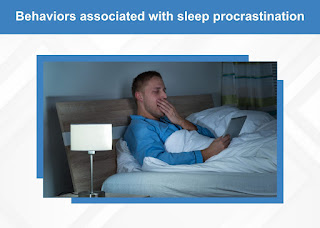What are the behaviors associated with bedtime procastination?
Bedtime
procrastination is a common struggle that many individuals face, often leading
to disrupted sleep patterns and diminished overall well-being. In a world
filled with distractions and responsibilities, it's easy to put off sleep in
favor of other activities. However, recognizing and addressing bedtime
procrastination is crucial for achieving a restful night's sleep and
maintaining optimal health. In this blog post, we'll explore the behaviors
associated with bedtime procrastination and provide valuable tips to help you
establish a healthy bedtime routine.
In the digital age,
screens have become an integral part of our lives. Bedtime procrastination
often starts with the irresistible pull of smartphones, tablets, and laptops.
Scrolling through social media, binge-watching TV shows, or endlessly browsing
the internet can eat into your sleep time, delaying the moment you finally
settle into bed.
Lacking a
structured bedtime routine can contribute to procrastination. When you don't
establish consistent pre-sleep rituals, it becomes easier to put off going to
bed. Instead of winding down, you find yourself caught up in last-minute
chores, tasks, or activities, leading to sleep deprivation.
Many people
underestimate the significance of sleep in their lives. When you don't fully
grasp the physical and mental health benefits of proper sleep, you might be
more inclined to delay bedtime in favor of other activities that seem more immediately
rewarding.
Bedtime can serve
as a point of transition from one day to the next. If you have pending tasks or
challenges awaiting you the next day, you might subconsciously delay going to
bed to avoid confronting them. This procrastination strategy only exacerbates
stress and sleep-related issues.
Consuming caffeine
or heavy snacks close to bedtime can disrupt your body's natural sleep-wake
cycle. Delaying bedtime becomes a consequence of engaging in these behaviors,
as your body struggles to wind down and prepare for restful sleep.
In our fast-paced
lives, overcommitting to work, social engagements, or personal projects can
lead to exhaustion. Paradoxically, this exhaustion might fuel bedtime
procrastination, as you attempt to squeeze in a few more moments of
productivity before surrendering to sleep.
An uncomfortable
mattress, a cluttered bedroom, or excessive noise can discourage you from
heading to bed. As you delay bedtime to avoid these discomforts, you
inadvertently perpetuate the cycle of procrastination.
Tips for Overcoming
Bedtime Procrastination:
Establish a Consistent
Routine: Create a nightly routine that signals your body it's time to wind
down. Engage in calming activities such as reading, listening to soothing
music, or practicing relaxation techniques.
Set a Digital Curfew:
Power down electronic devices at least an hour before bedtime to reduce blue
light exposure and give your brain a chance to relax.
Plan Ahead: Make a
to-do list for the next day before your designated wind-down time. This can
help you avoid getting caught up in planning when you should be preparing for
sleep.
Mindfulness and
Meditation: Engage in mindfulness exercises or meditation to calm your mind and
reduce anxiety before bed.
Create a Comfortable
Sleep Environment: Make sure your bedroom is conducive to sleep – comfortable
mattress, dim lighting, and a cool, quiet atmosphere.
Limit Late-Night
Snacking: Avoid heavy meals and caffeine close to bedtime. Opt for light,
sleep-inducing snacks if you're hungry.
Set a Bedtime Alarm:
Just as you set an alarm to wake up, set one to remind you to start your
bedtime routine.
Bedtime procrastination is a multifaceted phenomenon that can disrupt your sleep schedule and impact your overall well-being. As an American mattress company, we recognize the importance of addressing these behaviors to promote healthy sleep habits. By acknowledging the factors contributing to bedtime procrastination and implementing strategies to counteract them, you can pave the way for restful nights and rejuvenated mornings.




Remember that sleep quality directly influences your physical health, cognitive function, and emotional well-being, making the pursuit of a superior sleep experience a journey well worth undertaking. Visit the Best Mattress Shop in Chennai to buy the best mattress to have the deepest sound sleep ever.
ReplyDelete